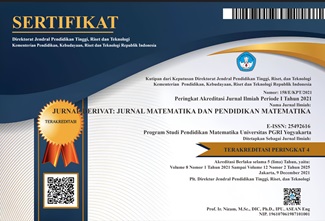Keefektifan Model Pembelajaran Creative Problem Solving (CPS) Terhadap Prestasi Belajar Matematika Smp Negeri 3 Ngabang
DOI:
https://doi.org/10.31316/j.derivat.v6i1.335Abstract
Abstract
Mathematics learning in SMP Negeri 3 Ngabang is still not optimal. The problem experienced is the lack of student involvement in the learning process. this is also related to the selection of inappropriate learning models. This affects the low student achievement. The purpose of this study was to determine the effectiveness of Creative Problem Solving (CPS) learning model on student mathematics learning achievement. The research method used is a quantitative method with comparative studies. The prerequisite test carried out normality test and homogeneity test. Hypothesis testing using the t-test. The results of the study show that the model CPS learning is effective against mathematics learning achievement compared to direct learning models. The results of the final data analysis showed the proportion of experimental class students had reached individual KKM with the results of tcount> ttable or 5.64> 1.68 Based on the average difference test obtained tcount= 1.751> 1.67 = t table and = 5%.
Â
Keywords: learning, learning achievement.Downloads
Published
Issue
Section
Citation Check
License
Authors who publish with this journal agree to the following terms:
-
Authors retain copyright and grant the journal right of first publication with the work simultaneously licensed under a Creative Commons Attribution-ShareAlike 4.0 International License that allows others to share the work with an acknowledgment of the work's authorship and initial publication in this journal.
- Authors are able to enter into separate, additional contractual arrangements for the non-exclusive distribution of the journal's published version of the work (e.g., post it to an institutional repository or publish it in a book), with an acknowledgment of its initial publication in this journal.
- Authors are permitted and encouraged to post their work online (e.g., in institutional repositories or on their website) prior to and during the submission process, as it can lead to productive exchanges, as well as earlier and greater citation of published work (See The Effect of Open Access).







